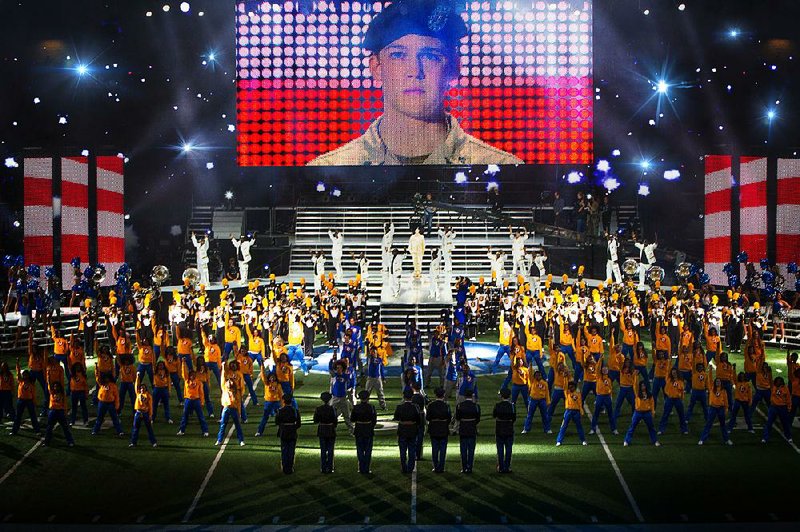LOS ANGELES -- Billy Lynn's Long Halftime Walk, Ang Lee's ambitious, uneven and heroically idiosyncratic new movie, follows a U.S. Army unit on a premature victory tour during the early days of the Iraq War. A few days before their redeployment, the men of Bravo Squad are trotted onto a Texas football field and into the embrace of a gushing, uncomprehending American public -- a show of support as surreal and disillusioning as the distant inferno from which these troops have just emerged.
We see a fuzzy glimpse of that inferno early on, when the camera of an embedded reporter catches 19-year-old Spc. Billy Lynn (Joe Alwyn) rushing to the aid of a sergeant under heavy enemy fire. The sergeant succumbs to his wounds, and the media immediately seize on the harrowing footage as a morale-boosting example of American heroism in action.
Billy Lynn’s Long Halftime Walk
83 Cast: Joe Alwyn, Garrett Hedlund, Steve Martin, Chris Tucker, Vin Diesel, Kristen Stewart, Tim Blake Nelson
Director: Ang Lee
Rating: R, for language throughout, some war violence, sexual content and brief drug use
Running time: 1 hour, 50 minutes
Billy Lynn's Long Halftime Walk, for its part, pursues a more difficult, nuanced conclusion. Patiently and scrupulously, if not always in the most dramatically sound fashion, it devotes itself to bringing these soldiers' fraught experience into clearer focus.
I mean that quite literally. Working with the cinematographer John Toll, Lee shot this feature at an unprecedented 120 frames per second (five times the usual rate) and in 4K resolution -- an enhancement that, along with the use of 3-D cameras, invests the image with an astonishing crispness. At its intermittent best, the technology -- similar to the 48 frames per second that Peter Jackson used for his Hobbit trilogy -- proves remarkably immersive, capable of investing both a scene of combat and a simple close-up with an almost unnerving physical and psychological intimacy.
The trouble with eliminating one visual barrier, in this case, is that another tends to spring up in its place. And at times in Billy Lynn's Long Halftime Walk, Lee's pursuit of an intense, uncompromising hyperrealism winds up merely underscoring its own digital artifice.
Should you see the film in one of the few U.S. theaters equipped to project it at the intended 4K, 3-D, 120-fps specifications, you may recognize its glaringly sharp look from the images on your own high-definition TV (especially with the "motion smoothing" setting still on). You may also struggle to find your way into a picture whose peripheral elements -- the phony, gestural performances of the background extras, the twangy refrain of Jeff and Mychael Danna's score -- seem much more obtrusive than they do at the standard frame rate.
All this contributes to a fascinating level of aesthetic confusion, one that doesn't feel entirely inappropriate to the moral and psychological disorientation that Lee means to examine. Adapted by Jean-Christophe Castelli from Ben Fountain's scaldingly humane 2012 novel, Billy Lynn's Long Halftime Walk casts a hard, mournful gaze at the indignities that its soldiers are made to suffer, from the lingering after-effects of post-traumatic stress disorder to the self-serving pageantry that awaits them back home.
From the moment we first meet Billy in a Texas hotel room, his head still throbbing from too many beers and strippers the night before, his unshakable hangover has the feel of a collective metaphor. Under the stern yet protective command of Sgt. David Dime (Garrett Hedlund), Billy and his fellow Bravo soldiers spend the next several hours navigating the bowels of Texas Stadium, where they're set to appear during a Dallas Cowboys halftime show.
Before the day is over they will be paraded before a news conference, welcomed by a friendly squad of cheerleaders and held up for the aggrandizement of the Cowboys' smarmy owner, Norm Oglesby (Steve Martin, an intriguing if distracting presence). Scene-setting references to early-aughties pop culture abound: The men share the stadium stage with a still-intact Destiny's Child (not playing themselves), and a few actors at the height of their late-'90s stardom -- the Hilary Swank of Boys Don't Cry, the Mark Wahlberg of Boogie Nights -- are referenced in connection with the movie that a Hollywood producer (Chris Tucker) is trying to make about Bravo's harrowing recent tour of duty.
Whatever that movie would have ended up looking like, it's almost certainly a more conventional, less politically charged picture than this one. Even as it evokes the wartime critiques of dramas such as The Best Years of Our Lives, Coming Home and Flags of Our Fathers, Billy Lynn's Long Halftime Walk draws its own pointed contrast among some of America's most cherished institutions -- football, celebrity, Thanksgiving, Hollywood -- and the stark reality of the conflict being waged ostensibly to preserve them.
Every so often Billy flashes back to Iraq in scenes that plunge us into the everyday tedium and the sudden terror of being on the front lines. We observe his affectionate conversations with Shroom (Vin Diesel), a self-styled Zen philosopher of a sergeant who becomes the story's first-scene casualty. And we also see Billy's subsequent confrontation with an Iraqi insurgent -- a scene that, like a similar encounter in Lee's underappreciated drama Lust, Caution, refuses to overlook the moral gravity of taking another human life.
A moment like that serves as a jolting reminder of where this filmmaker's strengths really lie. For all the envelope-pushing digital sorcery in this movie and his previous, Oscar-winning Life of Pi, Lee is an old-fashioned classical humanist at heart, one whose greatest achievements, Crouching Tiger, Hidden Dragon and Brokeback Mountain, are triumphs of sly social criticism and piercing emotion rather than technical trickery.
Lee's great recurring theme is the unspoken tension between a society's oppressive traditions and a brave individual who refuses to fit the mold. Billy Lynn's Long Halftime Walk is very much about its hero's gradual awakening, his realization that he and his comrades have been co-opted by a canned, pseudo-patriotic spectacle. And Alwyn, a gifted British newcomer, captures that epiphany with a quiet sensitivity that is one of the movie's few unambiguous triumphs.
But the sharp satirical edge that earned Fountain's novel comparisons to Catch-22 feels duller and more sluggish on the screen as Lee strains to weave his story's dissonant tones and subplots -- a behind-the-curtains quickie with a cheerleader, a skirmish with some stadium workers who don't exactly support the troops -- into a movie that works as a compelling psychological portrait and an astute political argument.
There is one sequence that accomplishes both those aims magnificently, using the high-speed, three-dimensional look to forge a powerfully visceral connection between the battleground of the Middle East and the public arena of a sporting event. Watching it, you finally understand why, nearly a decade after a surge of American dramas about the Iraq War, Lee opted to return to this not-so-distant past as a means of pioneering a bold new technological future.
MovieStyle on 11/18/2016

